Key takeaways:
- The social innovation marketplace encourages collaboration among diverse stakeholders, fostering holistic solutions to social issues.
- Sustainable outcomes are essential for lasting community impact, promoting resilience and attracting long-term investment.
- Engaging the community in decision-making enhances initiatives and empowers participants, leading to more effective solutions.
- Building authentic connections and adaptability are critical for success in social innovation, along with recognizing and celebrating small wins.
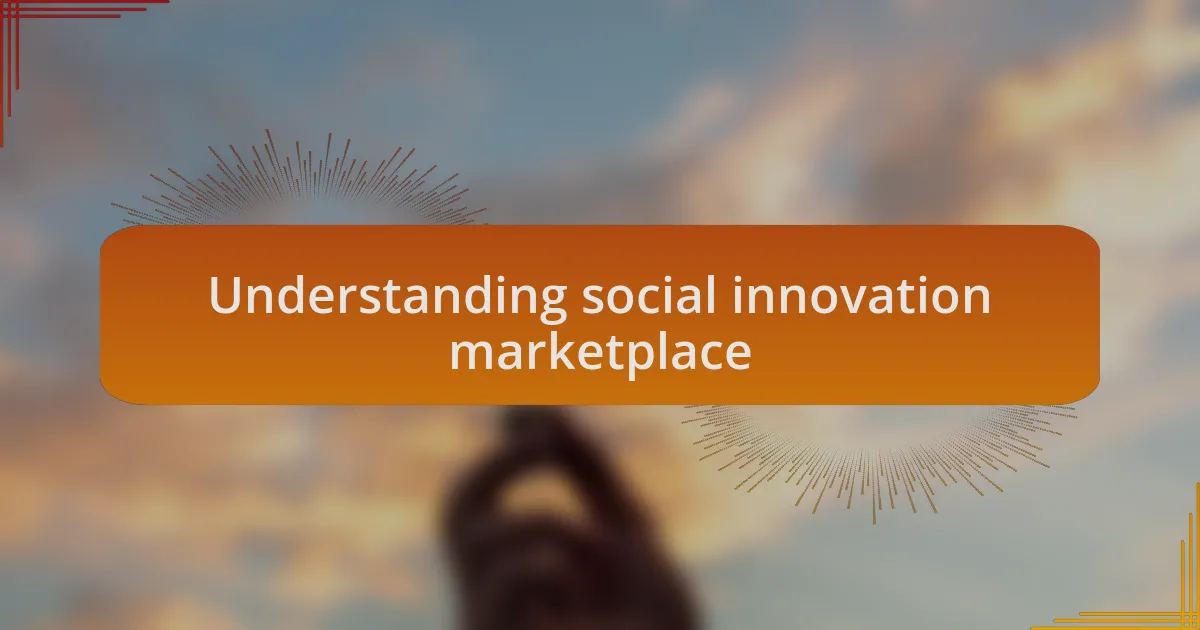
Understanding social innovation marketplace
The social innovation marketplace is a vibrant space where diverse ideas and solutions come together, all aimed at addressing pressing social issues. Reflecting on my own experience, I remember the excitement I felt when I first encountered grassroots initiatives that challenged the norm and brought about real change in their communities. Have you ever wondered how a simple concept can ignite a movement?
This marketplace thrives on collaboration, bringing together non-profits, businesses, and social entrepreneurs—all motivated by shared goals. I often think of a local project I supported, where entrepreneurs pooled resources to tackle homelessness. It was incredible to witness how different perspectives merged to create holistic solutions that were both innovative and sustainable.
Navigating this landscape can be complex, yet it’s filled with opportunities for those willing to engage. I often ask myself how we can effectively measure social impact within these initiatives. The answer lies in understanding that success isn’t just about profits; it’s about the positive change that resonates within communities and transforms lives.
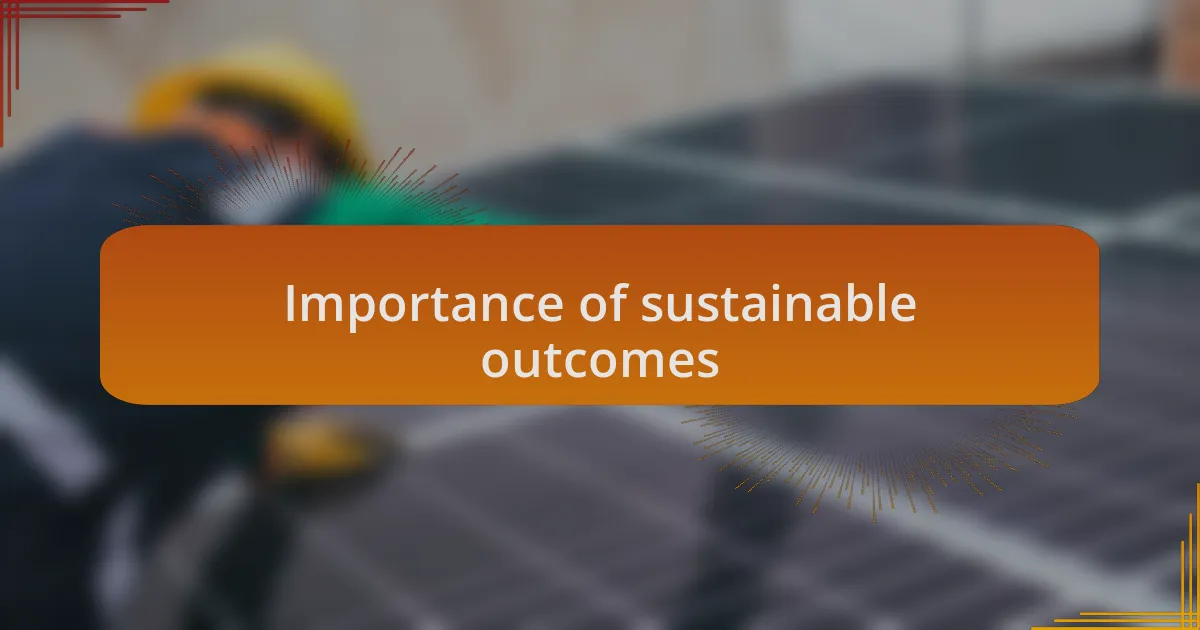
Importance of sustainable outcomes
Sustainable outcomes are crucial because they ensure that the benefits of social innovations extend far beyond initial efforts. When I participated in a community garden project, I saw how planting seeds went beyond vegetables; it fostered community relationships and empowered residents. Have you ever thought about how such initiatives can create lasting change that continues to nurture communities long after the initial spark?
Moreover, the importance of sustainable outcomes lies in their ability to promote resilience. For instance, during a local food security initiative I was involved in, we not only provided immediate relief but also equipped participants with skills to grow their own food. This shift from dependence to self-sufficiency sparked a change in mindset that I believe is vital for sustainable development. It prompts me to ask—how can we further engrain this sense of empowerment in other social projects?
Lastly, sustainable outcomes facilitate long-term investment from stakeholders. When I realized that funders were more inclined to support projects with measurable, enduring impacts, it sparked a deeper awareness in me. The drive for sustainability shapes how we frame our solutions, weaving financial viability into the social fabric we aim to strengthen. It’s intriguing—how can we shift our narratives to inspire further commitment towards sustainability in social innovation?
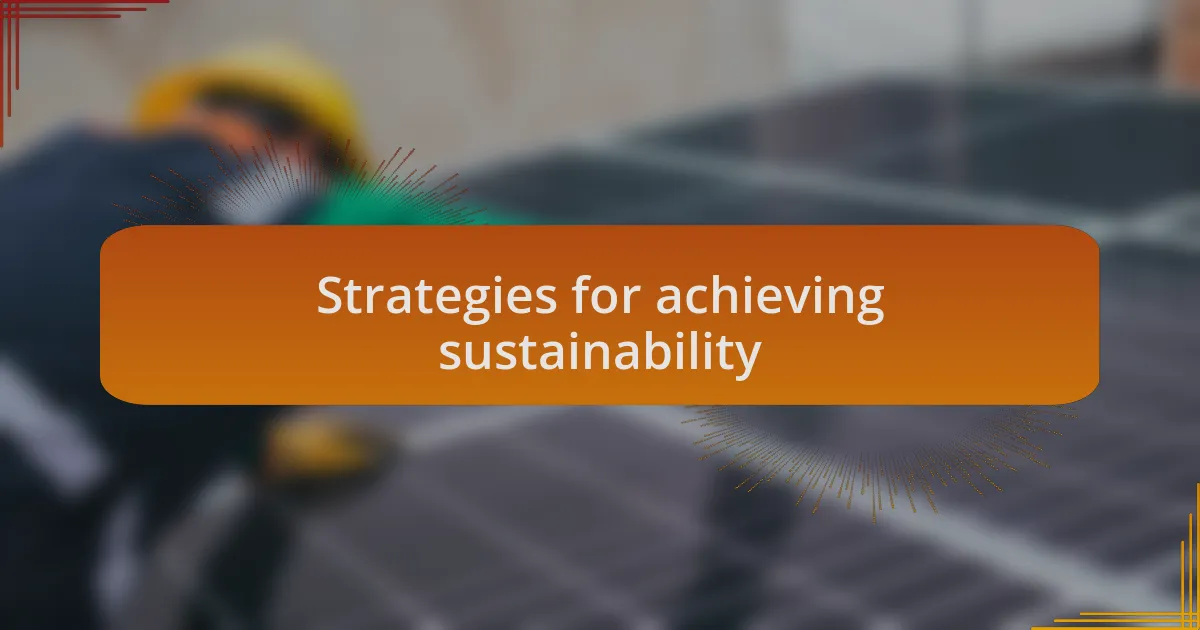
Strategies for achieving sustainability
One effective strategy I’ve seen for achieving sustainability is fostering collaboration among stakeholders. I remember a project where we united local businesses, schools, and nonprofits around a common goal of promoting environmental stewardship. This partnership not only shared resources but also encouraged each entity to leverage its unique strengths. What would happen if we applied this model more broadly across different sectors?
Engaging the community in decision-making can also significantly enhance sustainability efforts. During one initiative, we hosted workshops where local residents could voice their ideas and concerns. Hearing their perspectives reshaped our approach and led to solutions that truly resonated with their needs. Isn’t it fascinating how empowering others not only strengthens initiatives but also builds a richer, more connected community?
Lastly, integrating technology can be a game changer for sustainable outcomes. In a past project, we implemented a mobile app that allowed users to track their energy consumption and connect with resources for reducing waste. This not only simplified complex information but also motivated participants to take action. How can we leverage digital tools to further inspire sustainable behaviors in the communities we serve?
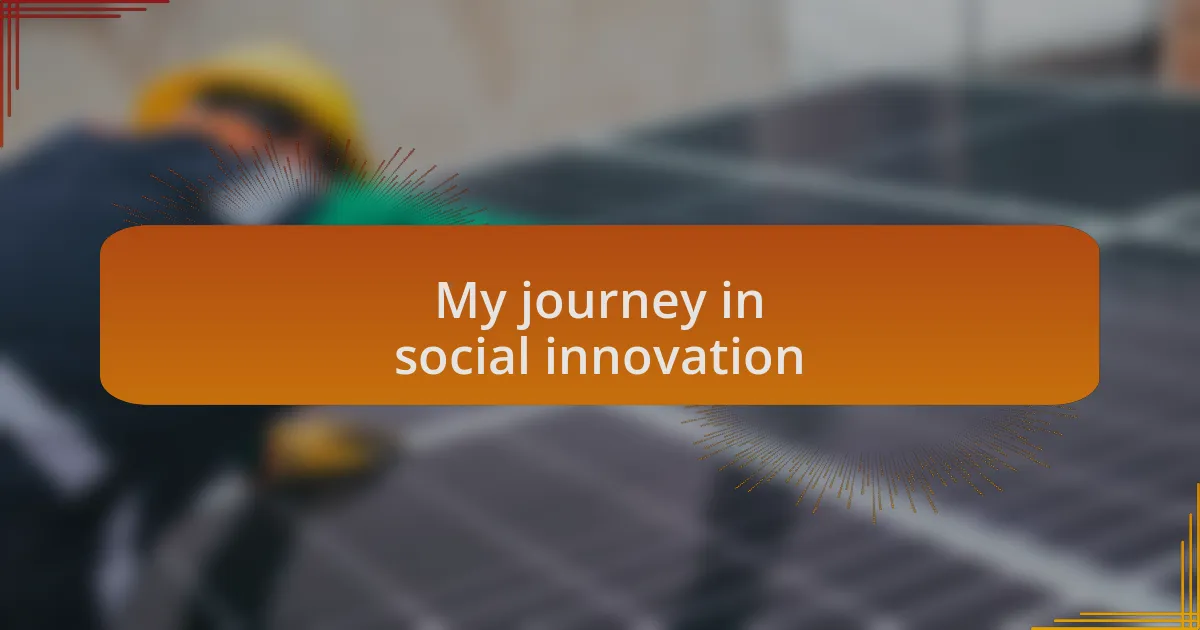
My journey in social innovation
Embarking on my journey in social innovation felt like stepping into uncharted territory. Early on, I found myself grappling with the reality that traditional methods of community engagement didn’t resonate with everyone. A turning point came when I facilitated a community forum that, surprisingly, revealed deep-seated frustrations about our initiatives. This experience taught me the importance of listening deeply and adapting our approach, igniting a passion for truly inclusive dialogue.
I vividly remember a project centered around agricultural sustainability, where we empowered farmers to share their innovative practices. Witnessing their pride as they showcased their methods was incredibly uplifting. This not only fostered a sense of ownership but also ignited a ripple effect as neighboring communities began adopting these sustainable techniques. Isn’t it remarkable how a simple conversation can plant the seeds for widespread change?
Reflecting on my experiences, I see the role of vulnerability in social innovation. In one challenging moment, I shared my uncertainties with the team about our impact measures. Rather than shying away, this honesty opened the floor for honest discussions, ultimately leading to a more robust evaluation framework. How liberating it is to realize that admitting our doubts can drive us all toward greater clarity and connection!
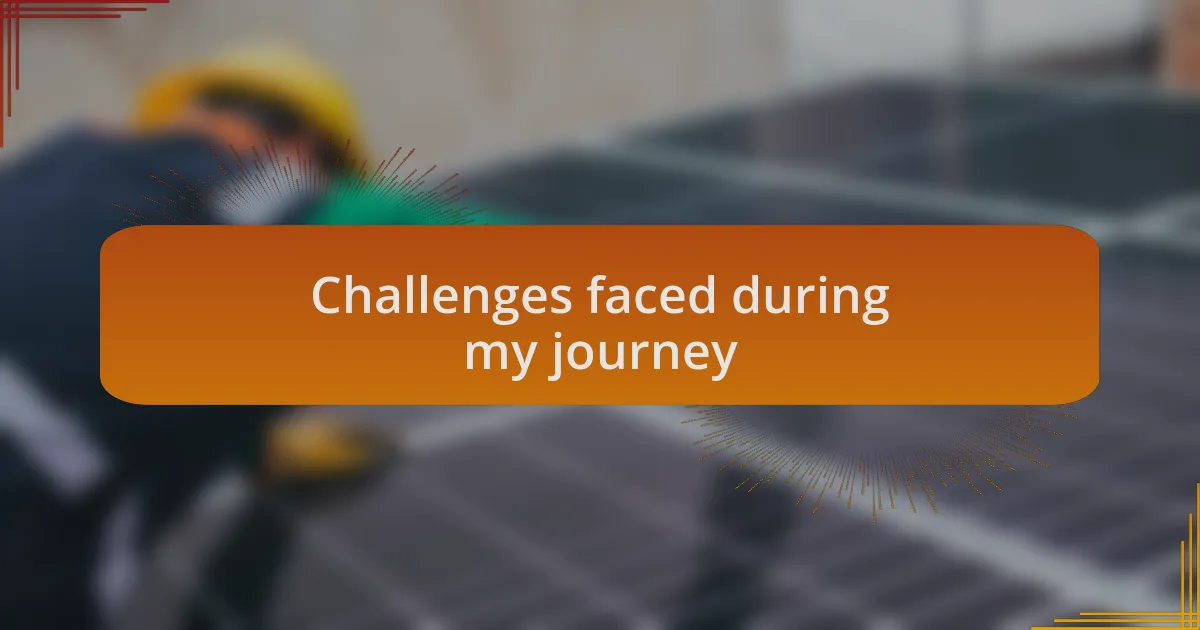
Challenges faced during my journey
As I navigated my journey, I encountered skepticism from various stakeholders. I remember pitching a new sustainability initiative to a group of local leaders who were deeply entrenched in traditional practices. Their reluctance to embrace change made me question not only my proposal but also my ability to communicate its value. How could I bridge that gap and foster a willingness to reconsider long-held beliefs?
Another significant hurdle was resource allocation. In one particular project aimed at enhancing educational outreach, we faced budget constraints that threatened to derail our efforts. It was frustrating to watch promising ideas get sidelined due to lack of funds. I realized then that I needed to become more resourceful, seeking partnerships and creative funding solutions to bring our vision to life. In moments like this, perseverance truly became my greatest ally.
A challenge that tested my resolve came when a major workshop I organized saw a disheartening turnout. Initially, I felt overwhelmed by disappointment and self-doubt. I couldn’t help but wonder if I had misjudged community interest. However, that experience pushed me to refine my outreach strategies, enabling me to better connect with my audience in future initiatives. Isn’t it through these setbacks that we gain the most valuable lessons?
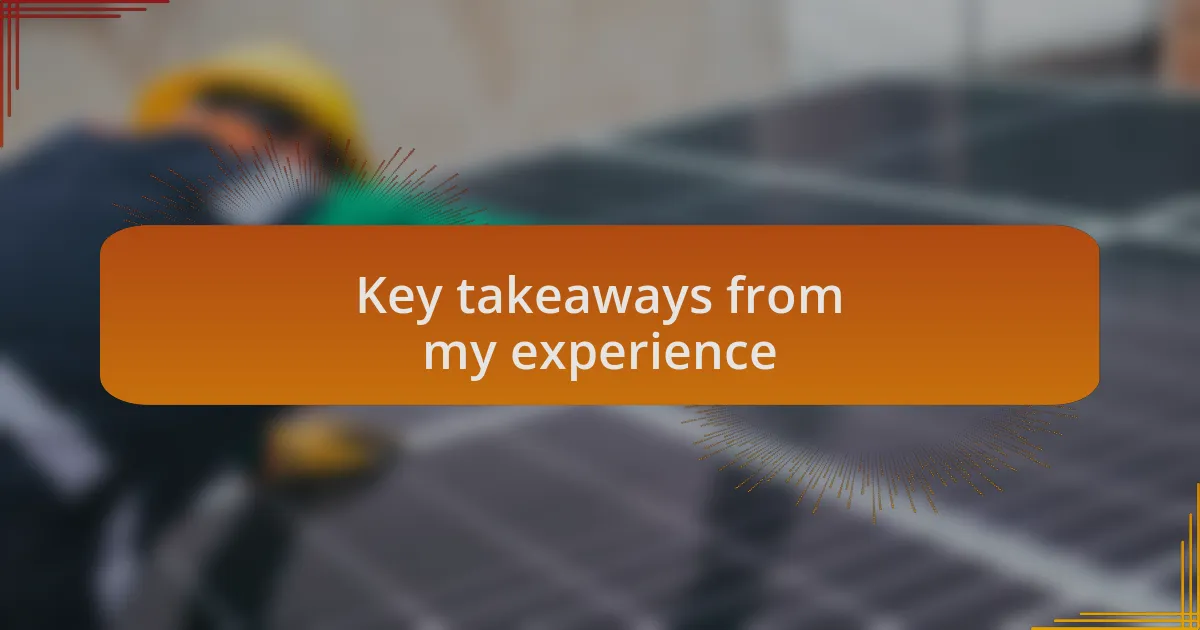
Key takeaways from my experience
Key takeaways from my experience
One of the most profound lessons I’ve learned is the importance of building authentic connections. During a project designed to engage youth in sustainability, I spent hours in community spaces just listening to their concerns and aspirations. The transformation that occurred when they felt heard was remarkable. Have you ever experienced the shift that happens when someone truly listens to you? It’s powerful.
Another key takeaway is the value of adaptability. I vividly recall a time when a proposed collaboration fell through at the last minute. Instead of giving in to frustration, I remembered the lessons from my earlier challenges. Embracing a flexible mindset helped me reimagine the project, leading to an unexpected partnership that exceeded my original vision. It reaffirmed my belief that sometimes the best outcomes arise from unforeseen changes.
Lastly, I discovered the necessity of celebrating small wins along the way. Early in my journey, I focused heavily on larger milestones, often overlooking the incremental successes that contributed to our overarching goals. I started keeping a journal to document these moments—whether it was a positive conversation with a community member or a successful workshop. This shift in perspective not only motivated me but also helped remind my team of the importance of progress, no matter how small. Isn’t it amazing how a little recognition can fuel passion and commitment?
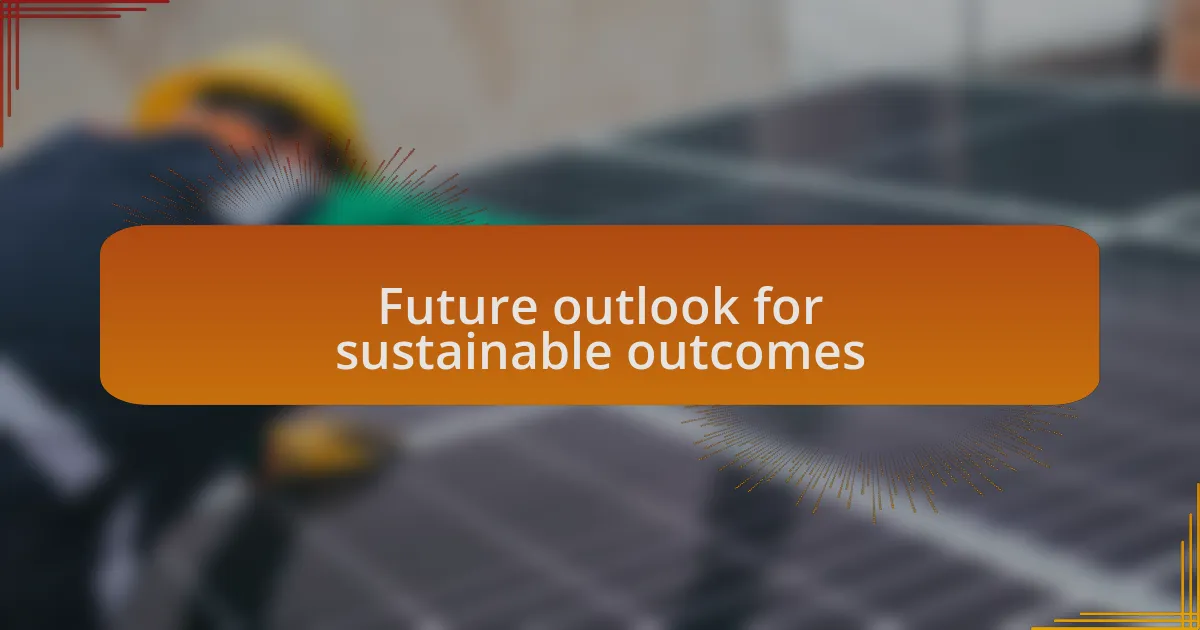
Future outlook for sustainable outcomes
Looking ahead, I believe that sustainable outcomes will increasingly rely on collaborative networks. During a recent project, I connected with diverse stakeholders, from local artisans to tech innovators, each bringing unique insights to the table. This interconnection enriched our solutions, demonstrating that no single entity holds the key to sustainable change. Isn’t it fascinating how the merging of varied perspectives can lead to innovative approaches?
Moreover, technological advancements will play a pivotal role in shaping our sustainable future. I remember when I first experimented with digital tools to track sustainability metrics for a community garden initiative. The data we collected opened our eyes to what worked and what needed adjustment. As we improve our ability to harness technology, I envision a future where real-time data can empower communities to adapt their practices more effectively.
Lastly, I can’t help but feel optimistic about the growing public awareness surrounding sustainability. Engaging in conversations about environmental responsibility has shifted from niche groups to mainstream discussions. Recently, I attended a local town hall meeting where residents passionately advocated for greener policies. It left me energized; when communities rally together around sustainability, the potential for impactful change becomes limitless. Wouldn’t you agree that collective action can truly redefine our future?